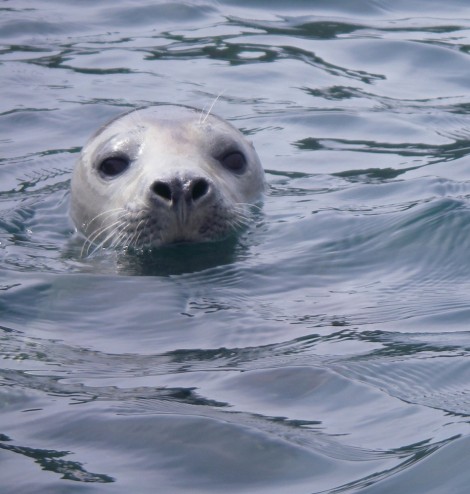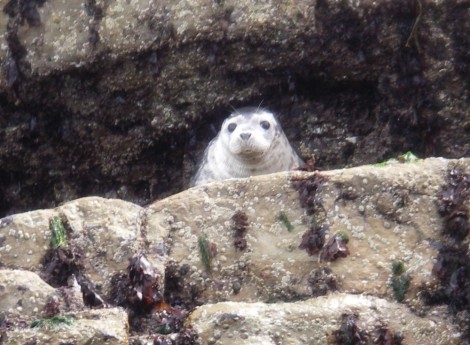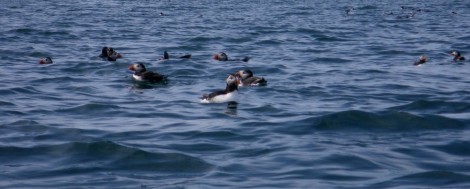Sensitive Sea Kayaking
One of the joys of sea kayaking is the opportunities it presents to view wildlife in its natural habitat. As kayakers we have a responsibility to develop a better understanding of the wildlife we encounter in order to minimise our impact.
There is a common misconception amongst us sea kayakers that we have less of an impact on wildlife than other (often bigger, faster and noisier) craft. In fact the opposite may well be nearer to the truth! In areas where there is heavy boat traffic wildlife does appear to become desensitised to it, this seems less evident in the case of kayaks, the following points may go some way to explaining why.
Predator
Most of us who have paddled with seals will have experienced them following our kayaks, sometimes for many miles. One theory behind this behaviour is that the profile of a sea kayak from the water is similar to that of a Shark or Orca, both of which predate on seals in UK waters. Seals have been observed to follow predators, keeping them in sight whilst staying away from the sharp end!
Stealthy approach / surprise
One of the advantages of wildlife watching from a kayak is the lack of engine noise; the flip side of this is that it is very easy to startle wildlife as there is little or no warning of our approach.
Get in closer
The fact that as kayakers we can get to areas which are inaccessible to other types of craft causes its own potential problems. We are able to approach wildlife which is usually hidden from human contact by its location and therefore likely to be less tolerant of our presence.
These issues are particularly relevant at certain times of year when marine wildlife is more sensitive to disturbance. Some of these key periods are outlined below:
Atlantic Grey Seal Pupping
Beginning of August – End of November
Atlantic Grey Seals visit the western coastline in their thousands during this time of year. The mothers give birth on beaches, ledges and in caves. The first 3 to 4 weeks of the pups’ lives are crucial to their survival. Disturbance during this time will often lead to them being abandoned before they have built up the fat reserves they need to fend for themselves.
Atlantic Grey Seal Malting
Seals also visit the coast in large numbers during early spring to malt. In order to malt they must raise their body temperature which they do by hauling themselves out onto rocks and ledges. If they feel threatened they will take to the water resulting in them cooling down and having to expend valuable energy getting back out. They will usually do this by stranding themselves on a dropping tide so a disturbance could lead to a long wait in the water.
General advice
1. Do not land on seal pupping beaches from August 1st to the end of November.
2. Avoid creeping up on seals or approaching seals bow on. They may perceive you as a predator.
3. Allow seals an escape route.
4. Do not disturb mothers nursing pups. Adult females often rest in the water about 10-30m from the shore and their pup – never paddle between the female and the pup.
5. For the sake of your safety and for the health of the seals themselves do not seek to swim with, touch or feed seals.
6. Limit observation time to 10 minutes then move on.
Sea bird breeding season
Beginning of March – End of July
Many species of sea birds visit the British coastline to raise their chicks during this time. Cliff nesting birds are particularly sensitive to disturbance; these include Guillemots, Razorbills and Kittiwakes. These smaller species are particularly at threat from predatory birds (Ravens, Peregrines, Skuas and Greater Black Backed Gulls) and can become an easy snack if driven off their nests or ledges.
Guillemots and Razorbills lay their eggs directly onto ledges rather than building a nest; if they are panicked eggs can easily be dislodged and lost.
Another common sight during this period is large “rafts” of birds on the water. Once their eggs have hatched parent birds will often rest on the water before returning to feed their young; if they feel threatened they may regurgitate the food intended for their chicks before flying away. This means that chicks miss out on valuable meals!
General advice
1. Plan trips carefully and with respect to any Agreed Site Specific Access Restrictions. They are in place to protect wildlife for future generations.
2. Observe bird’s reactions from a distance.
3. The following bird behaviour indicates preparedness to fly; head craning, head turning, head bobbing and wing flapping in situ. Do not proceed if you observe this as you will make them fly – never approach closer than 10m.
4. Auks (guillemots, razorbills) incubate eggs on their feet; if they fly off ledges in a panic their eggs are dislodged and destroyed.
5. On open water you may encounter ‘rafts’ of sea birds. Avoid causing disturbance to rafting birds as they may regurgitate food meant for their young / take flight during valuable resting time.
Cetaceans
Cetaceans (Whales, Dolphins and Porpoise) are present year round in British waters, although there are definite seasonal movements encounters are far more difficult to predict and can happen at any time of year.
General advice
1. On encountering cetaceans continue on your intended route as this will present predictable movements.
2. Allow groups of cetaceans to remain together.
3. Leave cetaceans with young alone.
4. Always allow cetaceans an escape route and avoid boxing them in.
5. Leave if you notice any signs of disturbance.
It is recommended that paddlers explore the marine environment in small groups both for safety, and to minimise wildlife disturbance / environmental impacts.
This article is based on my experiences paddling with wildlife off the coast of West Wales, wildlife encountered and seasonal trends will vary in other areas.
For more information on Pembrokeshire’s marine code agreement and seasonal access restrictions visit: www.pembrokeshiremarinecode.org.uk
comment
Please Leave a Reply
TrackBack URL :











Brilliant article and good advice, it always a privilege to observe our marine wildlife and it’s unfortunate that some people don’t respect them.